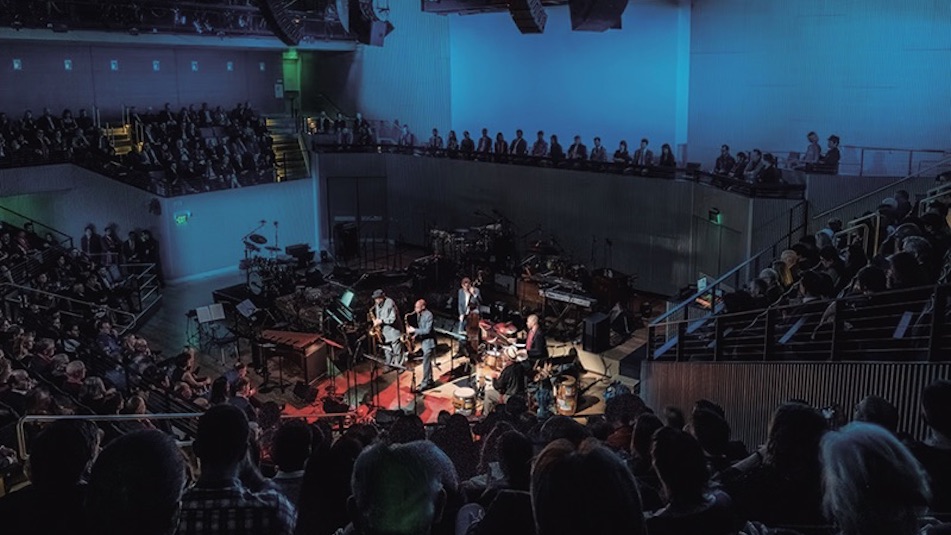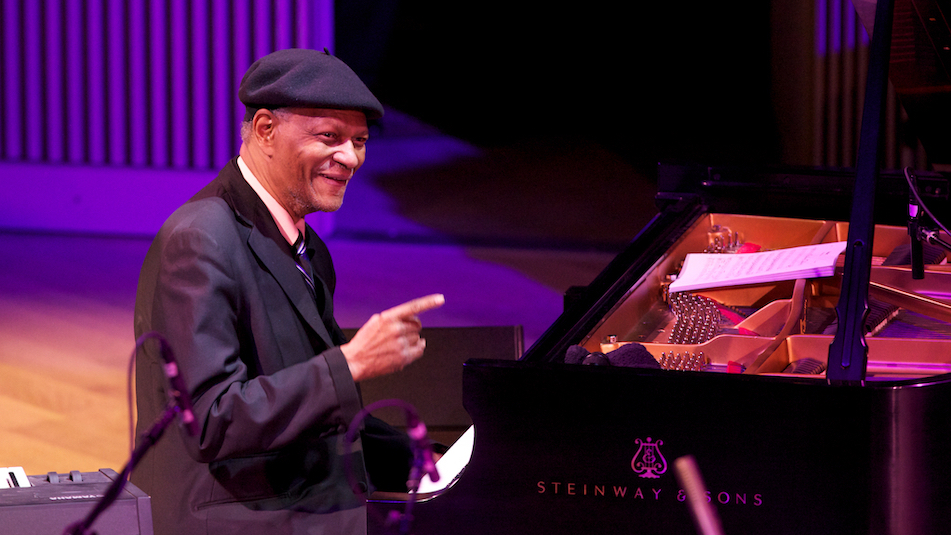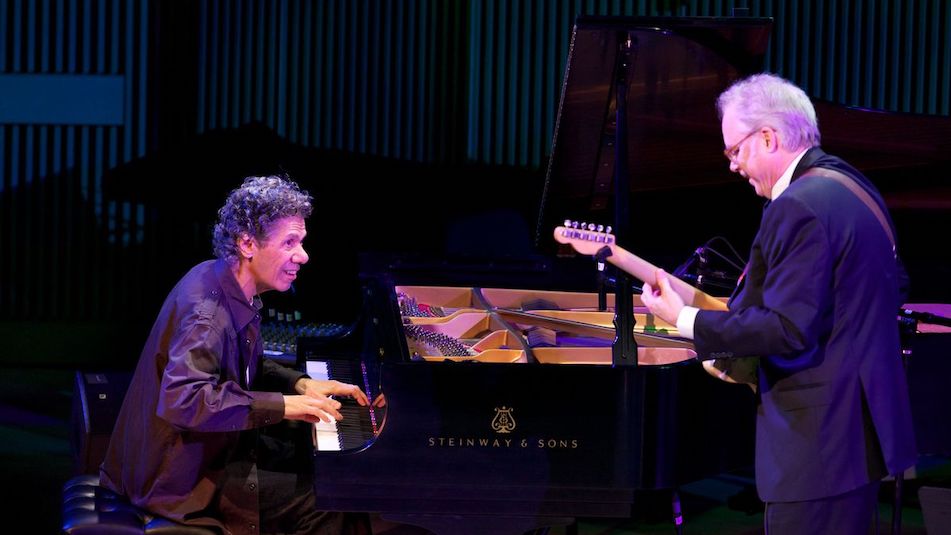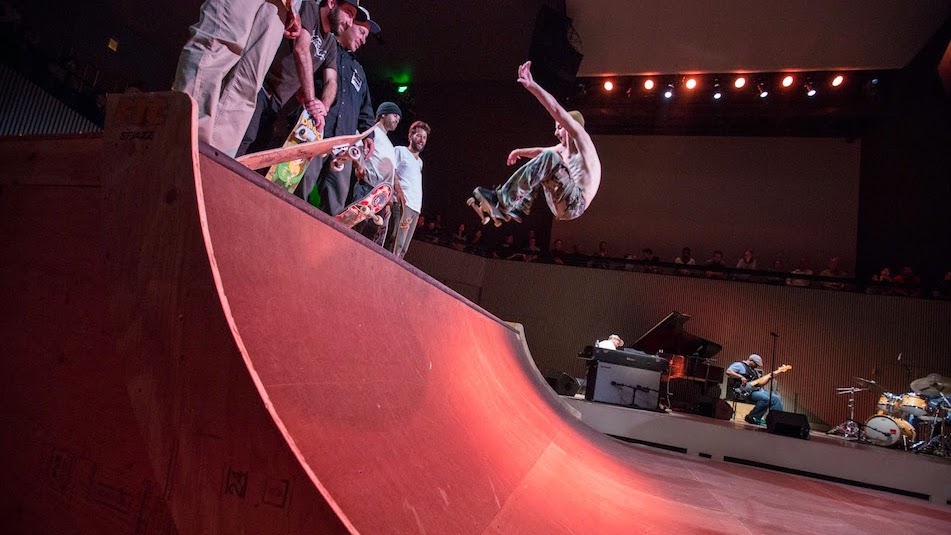THE SFJAZZ CENTER at 10:
Looking back & looking forward
January 3, 2023 | by Richard Scheinin

Opening night at the SFJAZZ Center, 1/23/13. (photo by Drew Altizer)
As we approach our 10th year in the SFJAZZ Center in January, staff writer Richard Scheinin looks back at a decade of unforgettable music and previews our upcoming week of celebrations, 1/12–15.
It’s been ten years?
Pianist Jason Moran laughs in disbelief, and then the memories come racing back.
Opening night at the SFJAZZ Center — January 23, 2013 — was a landmark event. The house was packed. You could feel the audience’s anticipation; a buzzing vibration ran through the hall. And then there was the astonishing array of musicians — legends — who gathered on stage to perform a kind of benediction for the venue. “How can I not remember?” asks Moran, who was among the performers that night. “There was McCoy Tyner. There was Chick Corea. There was Bobby Hutcherson,” he says, naming three of the most consequential improvisers in the entire history of modern jazz. “It was the kind of cast that SFJAZZ is well known for putting together, a unique mix. And it was multi-generational — elder musicians, but younger musicians, too, and that was powerful. It was humbling to be there. I think that was the greatest thing about that night — that it would humble your ass. The breadth and scope of it was extraordinary, and the audience was just sitting there and waiting for the music. And I’ve come to know that it’s almost always like that when I play in that hall. It’s a beacon to the way this music can be presented in America.”
Now SFJAZZ is presenting a 10th Anniversary Celebration for the SFJAZZ Center, which has become a mecca for the music. It manages to combine the energy of a great little jazz club with the comforts and sound quality of a fine concert hall — and over the past decade, everybody has played there.
On Jan. 12, saxophonist Joe Lovano will lead an all-star tribute to Tyner, who died in 2020 at age 82 after a 60-year career during which he revolutionized the language of jazz piano, first as a member of the John Coltrane Quartet and then as a leader of his own bands. On Jan. 13, bassist Stanley Clarke will guide his group through a tribute to keyboardist Corea — who died in 2021 at 79, leaving his own indelible legacy — and the band they made famous together, Return to Forever.
The celebration will finish with a pair of reunion concerts (1/14–15) featuring a dozen groundbreaking artists who have served as Resident Artistic Directors at the SFJAZZ Center over the past decade. They include Laurie Anderson, the composer, violinist, and multi-media superstar; drummer Terri Lyne Carrington, a 2021 NEA Jazz Master; guitarist Bill Frisell; saxophonist Chris Potter; Moran; and singer Mary Stallings, who grew up just a mile or so from where the SFJAZZ Center now stands. She likens performing on its stage to “standing in a cloud, where I’m surrounded by peaceful energy that resonates from my toes to the top of my head. When you’re in an environment like that — that’s for me. Every note I sing feels warmer than the one before; I’m sending out the vibes.”
McCoy Tyner Tribute (Jan. 12, 7:30pm)
If you saw Tyner perform, you know the impact of his music. The sound of a single chord could move listeners to tears. He was the source of much of jazz’s harmonic and rhythmic vocabulary in the second half of the 20th century. And he sounded — and still sounds, on his many recordings — nothing like the other jazz piano masters who emerged in the 1960s, namely Herbie Hancock, Keith Jarrett, and Chick Corea. (Though each of them at times sounded like Tyner.)

McCoy Tyner on stage during the Opening Night Concert, 1/23/13. (photo by Scott Chernis)
The SFJAZZ homage to Tyner is helmed by saxophonist Joe Lovano, who performed often with the pianist in the final 20 years of his life.
Lovano learned some basic lessons about communication from the pianist: “He played for the people, man. Every phrase was a delivery.” And on a purely musical level, standing onstage with Tyner was a revelation: “With McCoy, whatever tune you were playing, whatever key it might be in, he was in all keys — he was in all 12! And he would feed you things, and if you really picked up on what was happening — I’d find myself in all keys. That was amazing, to be part of this spontaneous harmonic sequencing that would happen with McCoy... He was so free, and yet he was grooving and there was the blues. The blues was in everything he did.”
Tyner was famous for building unusually wide-open chords, often based on intervals of fourths — the distance from do to fa in an octave. One of his early albums as a leader was titled Reaching Fourth, a phrase that refers specifically to his harmonies. But it also hints at his artistic intentions — that he was always reaching forth, searching for possibilities, seeking emotional and spiritual connections with his listeners.
“And we will be reaching forth,” promises Lovano.
He has assembled a remarkable band for the tribute. It includes saxophonist Gary Bartz, a giant on his instrument, who played with Tyner regularly over the course of 50 years. Trumpeter Eddie Henderson, raised in Oakland, was another of Tyner’s favorites — as was pianist Kenny Barron, who, like Tyner, grew up in Philadelphia when that city was generating one musical genius after the next. Barron will anchor the rhythm section that Lovano has recruited. It also sports Gerald Cannon, Tyner’s rock-solid bassist in later years, and the astounding drummer Jeff “Tain” Watts.
In 2007, Tyner released his album Quartet, recorded live at Yoshi’s jazz club in Oakland with Lovano, bassist Christian McBride, and drummer Watts. They performed a number of Tyner’s memorable tunes: “Passion Dance,” “Blues on the Corner,” “Search for Peace.” In 2013, on opening night at the SFJAZZ Center, Tyner’s quartet with Lovano, bassist esperanza spalding, and drummer Eric Harland performed “Walk Spirit, Talk Spirit,” another of the pianist’s anthems.
Lovano expects to re-visit some of those compositions: “I’d like to draw from some of the classic things we did together. But I’m also going to ask Gary Bartz to say what he’d like to play. Maybe Kenny will do some solo things. I’m going to ask everybody to contribute ideas about how they’d like to honor McCoy. It’ll take shape. I’m thrilled that SFJAZZ has asked me to be involved — that they have the confidence in me. And I’m mostly just thrilled to be part of this tribute to my friend McCoy.”
Tribute to Chick Corea: Stanley Clarke N Forever (Jan. 13, 7 and 9:30pm)
For better than half a century, Corea was among the most distinguished bandleaders in jazz. In 1968, he recorded one of the greatest of all acoustic jazz trio records, Now He Sings, Now He Sobs, featuring one of the greatest of all jazz drummers, Roy Haynes. Nearly 50 years after that, he formed an electric band called Vigil, featuring another fabulous drummer, Marcus Gilmore —Haynes’s grandson. You get the idea: Corea’s musical life spanned generations. He understood the tradition and he understood talent.
Effortlessly, he covered a lot of stylistic fronts. In a single set, he might address bebop, avant-garde, acoustic modal jazz, samba, electric fusion, all of it stamped by his trademark touch — a kind of taut clarity, absolute precision, applied to a dancing, open-ended stream of ideas. With Miles Davis’s band — and with his own groups, most notably Return to Forever — he expanded the role of keyboards in jazz. He helped pioneer electricity in the music, and his compositions for Return to Forever have become standards. They are complexly structured, yet instantly recognizable because of his gift for song-like melody: “Spain,” “Sometime Ago — La Fiesta,” “Hymn of the Seventh Galaxy.”
His partner in Return to Forever was bassist Stanley Clarke, a ferocious virtuoso whose lyricism matched Corea’s own, and whose buoyant, percolating bass lines were the bedrock for their collaboration. Clarke, like Corea, has always been a talent scout. At SFJAZZ, his youthful quartet — with guitarist Colin Cook, keyboardist Jahari Stampley, and drummer Jeremiah Collier — will reinvent some of the best-known Return to Forever tunes, putting special emphasis on those from the popular 1976 album Romantic Warrior.
On opening night in 2013, Corea joined the SFJAZZ Collective on keyboards for a performance of “Spain.” He also played acoustic piano with guitarist Bill Frisell — it was the first time they’d ever performed together and Frisell remembers how anxious he felt: “It was like, `How is this? I must be dreaming.’ I’d seen Chick play millions of times, because he was one of the guys who shaped my musical outlook when I was younger — he was one of those. So I was a little bit terrified when someone told me that I’d be playing a duet with him on opening night. But we talked on the phone before it happened, and he was like, `Come on, I can’t think of a better way to start off the year than to play a tune with you.’ Oh, really?”

Chick Corea and Bill Frisell, opening night at the SFJAZZ Center, 1/23/13. (photo by Scott Chernis)
Frisell needn’t have worried. When he and Corea played “It Could Happen To You,” a magic spontaneity took over. It was meditative and beautiful, and the audience was rapt.
“That was a thrill for me,” he says. “That’s ten years ago? Oh man, I can’t even believe it. It’s a little bit overwhelming — I mean emotionally, because so many of these people aren’t here anymore. Those were my heroes, and I got to play with them: Chick and McCoy and Bobby Hutcherson. Those things happened right there, on that stage. And how lucky could I be to spend time with those people?”
SFJAZZ Resident Artistic Directors Reunion Concerts (Jan. 14, 7:30pm; Jan. 15, 7pm)
On opening night in 2013, the ensembles kept morphing. A duo gave way to a trio, or a trio to a quartet — or a nonet, when Corea sat down with the eight-piece all-star SFJAZZ Collective.
The effect was freewheeling. Mary Stallings — introduced as “the world’s greatest jazz singer” by Randall Kline, SFJAZZ’s founder — sang Peggy Lee’s “I Love Being Here With You” with the SFJAZZ High School All-Stars. Old-school swing, nice and bluesy, it was followed by pianist Moran and drummer Eric Harland. The duo squeezed a Fats Waller tune (“Yacht Club Swing”) through the wringer: out the other side came not only Waller-ish stride piano, but Bud Powell-ish bebop sprints, hypnotic Afro-jazz vamps, and full-on hip-hop. Then came Corea and Frisell. After that, came saxophonist Joshua Redman, embracing the outright romance of Irving Berlin’s “Remember.” He was part of a quartet with pianist Eric Reed, whose rich musical language drew from the Black church, from Bud Powell — and from McCoy Tyner, who followed.
It added up to a portrait of jazz, in many dimensions – and that’s what these upcoming Reunion Concerts are intended to recapture.
Expect the unexpected.
The first concert features Laurie Anderson, who once gave a street-corner viola recital while wearing skates embedded in blocks of ice that melted as she played. A performance artist who designs software and virtual reality environments, she is always searching for what she calls “disembodiment.” It’s her goal as an artist: “To get lost and to get free.”
Four years ago, she became a Resident Artistic Director at SFJAZZ, which offered her a blank canvas on which to create a weeklong series of musical programs. She enjoyed the planning process: “Basically,” she explained, “you invite all your friends over to play and try to make the situations that create the most fun.”
Imagine the fun she will have on Jan. 14 with these four musicians, who, like her, live in the moment and enjoy engaging with big musical ideas: pianist Jason Moran, guitarist Bill Frisell, bassist Marcus Shelby, and drummer Terri Lyne Carrington. All four are past (or, in Carrington’s case, current) Resident Artistic Directors, and all enjoy the challenge of creating from a blank slate.
In 2013, Moran’s inaugural residency was a doozy: He convinced SFJAZZ to install a half-pipe in front of the stage and invited nine of San Francisco’s best skateboarders to collaborate with his trio, the Bandwagon. It was a new kind of jam session: You could feel the musicians feeding off the skaters’ energy, their rhythm and flow. “I just felt it was an obvious thing to try in San Francisco, which for me has always been a skateboarding mecca,” Moran says, matter-of-factly. Then comes the punch line: “And they actually let me do it!”

Jason Moran and the Bandwagon with skateboarders, 2013. (photo by Scott Chernis)
Also in 2013, Frisell’s residency included a multi-media enactment of gonzo journalist Hunter S. Thompson’s The Kentucky Derby is Decadent and Depraved, with recitation by actor Tim Robbins, visuals by political cartoonist Ralph Steadman, and original music by Frisell. In 2019, Shelby presented “Black Ball: The Negro Leagues and the Blues,” his extended composition for big band. A baseball freak and a serious student of history, Shelby drew connections between the barnstorming teams of the old Negro Leagues and the barnstorming territory bands of the Swing Era.
Next month (on Feb. 24), Carrington will also address the history of jazz, which is often told as the history of male musicians playing songs composed by men. Her program — titled “New Standards” — suggests a paradigm shift, in that she and her band will perform only tunes composed by women. It’s part of a larger project: Carrington has already released an album and an e-book compiling compositions by a who’s who of women instrumentalists, including Mary Lou Williams, Alice Coltrane, Carla Bley, Geri Allen, esperanza spalding, and many others. Carrington is on a mission, to create jazz without patriarchy.
Now let’s look at the second of the Reunion Concerts — this one with eight Resident Artistic Directors, past and present.
Moran is back on piano. Shelby is back on bass. The rhythm section is completed by the explosive drummer Eric Harland, for many years a member of the SFJAZZ Collective, and percussionist John Santos, whose decades-long resume includes stints with legendary musicians like percussionist Tito Puente, bassist Israel “Cachao” Lopez, pianist Eddie Palmieri, and trumpeter Dizzy Gillespie.
That’s just the rhythm section.
Now look at the ensemble’s front line: Chris Potter, Miguel Zenón, and Soweto Kinch. These are three formidable saxophonists — and you can bet they’ve never performed together until now, if only because Kinch spends most of his time in his native England. He is a creative whirlwind: He plays bebop, he raps, and he is one of the wellsprings for the flourishing London jazz scene of recent years.
Finally, the band also includes “the world’s greatest jazz singer,” as Randall Kline described Mary Stallings back in 2013. If you need more convincing, consider that The New York Times once said this about her: “Perhaps the best jazz singer singing today is a woman almost everybody seems to have missed.”
Not quite. Stallings, who is 83, sang with Dizzy Gillespie when she was 19. Over the course of her career, she has performed with Billy Eckstine, Earl Hines, Sonny Stitt, Cal Tjader and Wes Montgomery. She spent three years as the “girl singer” with Count Basie and his orchestra. She toured Latin America with Gillespie. Her career has moved in phases — she spent years off the road, raising her daughter and designing clothes as a sideline — but “everybody” has not missed her.
In San Francisco, where she grew up and still lives, Stallings is musical royalty. In 2017, when she was a Resident Artistic Director with SFJAZZ, she put together a week’s worth of programs with several impeccable bands. Performing one night with a trio led by pianist Bruce Barth, she sang “I Want to Talk About You,” Eckstine’s signature song. The audience was stone silent, captured by Stallings, who seemed to be singing her life. “You do it from your soul and from your heart, and with the hope that you are connecting with somebody,” she later explained. “I look at the faces; am I touching them?”
She will touch you.
Our 10th Anniversary week begins 1/12 with a McCoy Tyner Tribute, followed by Stanley Clarke's salute to Chick Corea and Return to Forever (1/13), and a pair of concerts featuring past and present SFJAZZ Resident Artistic DIrectors (1/14–15). Tickets available here.
A staff writer at SFJAZZ, Richard Scheinin is a lifelong journalist. He was the San Jose Mercury News' classical music and jazz critic for more than a decade and has profiled scores of public figures, from Ike Turner to Tony La Russa and the Dalai Lama.
